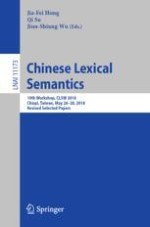2018 | OriginalPaper | Chapter
The Semantic Differences and Substitution Restrictions of -Zhe(着) and Zhengzai(正在)
Authors : Jie Fan, Chong-ming Ding
Published in: Chinese Lexical Semantics
Publisher: Springer International Publishing
Activate our intelligent search to find suitable subject content or patents.
Select sections of text to find matching patents with Artificial Intelligence. powered by
Select sections of text to find additional relevant content using AI-assisted search. powered by
